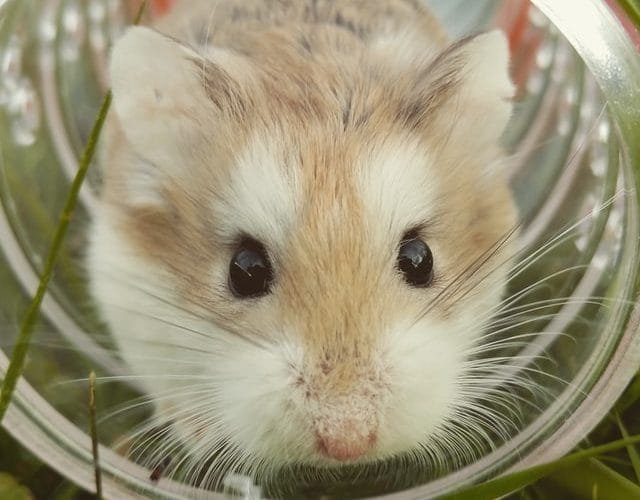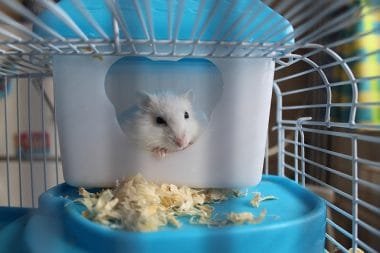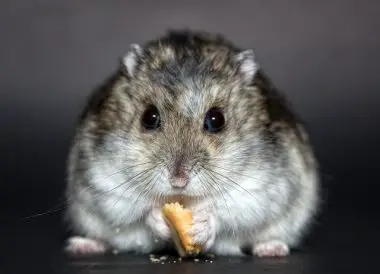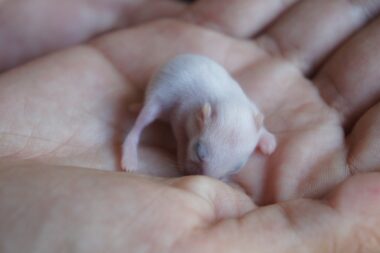Hamsters are small and common pets in many countries. People usually bring this as a starter pet for their children. Their availability is wide, and they are easy to take care of. The Syrian breed or golden species hamsters are most commonly kept as pets in homes.
‘Why did my hamster die?’ This question might have arisen in your mind due to your hamster’s sudden death. There are many reasons which can be related to the death of your hamster. Some of them die at a very small age. The sudden death of a Hamster without any reason is a common thing. You have to understand that it is not always the pet owner’s fault.
17 Reasons for Hamsters Sudden Death
‘Why did my hamster die?’ This might be affecting you a lot and making you desperate for answers. It is not easy to tell the specific and correct reason for the hamster’s unexpected death. Here are some reasons that might lead to their sudden death.
Heart Conditions
Heart diseases are common in hamsters. Hamsters can get heart diseases due to heredity, stress, and secondary heart failure.
The most common cause is congestive heart failure. It leads to the weakening of heart muscles making them unable to pump the blood. Symptoms of congestive heart failure are respiratory distress, edema, the blueish color of skin, etc.
Polymyopathy is a hereditary heart disease that can also weaken muscles in the hamster’s body. It can become the reason for cardiac arrest in hamsters.
Atrial thrombosis is also a common heart disease seen in hamsters. Symptoms of Atrial thrombosis are rapid breathing and blue color feet. The hamsters can die within a week of showing these symptoms. It is important to observe these symptoms of heart disease to take prompt care of your hamster.
Wet Tail
The most common disease for hamsters is a wet tail. Symptoms of this disease are wetness near their genital area, lethargy, weight loss, and messy coats. It is a spontaneous disease. It is also called diarrhea in hamsters. Stress can be a reason for wet tails. Hamsters can die after 24 – 72 hours of their first symptom. If an old hamster is suffering from a wet tail then there will be fewer chances of its survival.
Old Age
The most common answer to this question ‘Why did my hamster die?’ is old age. The age of hamsters is often not known or neglected by pet owners. It is observed that old hamsters suffer the most from sudden and unexpected death. Old age is a common reason because old hamsters are prone to various diseases. The maximum age of hamsters is 3 years and their average lifespan is 12 months to 18 months. Hamsters are considered old after 2 years of age. Old age can make them less active. They even have a weak immune system in old age which makes them prone to lethargy which is a sign of illness in hamsters.
Improper Diet
Food that the hamster consumes can also have a major effect on its health. Excessive protein and sulfur can have an impact on their health which is sometimes unnoticeable. Giving them unwashed fruits and vegetables can also be harmful. Excessive salt intake can lead to dehydration in their body. Contamination of food can also have a bad impact on their health. Eating less food is another problem that can slowly lead to major problems in health. Another reason could be the overweight of the pet which can also cause their unexpected death. If a hamster is not provided with essential nutrients, then this can be fatal for them as it causes gastrointestinal diseases.
Foods that are harmful to hamsters are:
- Raw potatoes and potato chips
- Onions
- Avocado
- Chocolate
- Seeds of fruits
- Chili peppers, and seasonings
- Apple seeds
- Tomato leaves
- Eggplant
- Iceberg lettuce
- Citrus fruits
- Grapes
- Mushrooms
- Raisins
- Bitter almonds
Some foods mentioned above are toxic for hamsters while some of them can upset their stomach. Eating them once might not cause sudden death. But eating these foods regularly can be harmful or fatal for them.
Illness
Many hamsters try to hide their illness, and they are pretty good at hiding it. You can witness their illness only if they are very sick. You can witness their sickness by observing changes in the behavior of hamsters. Old hamsters usually sleep more during illness making them less active. Changes that can occur in their regular behavior are lethargy, change in eating habits, increased urination, increased thirst. Other symptoms are weight loss, change in breathing pattern, allergies which can further cause hair loss, etc.
Stress
It is a condition that affects the entire health of hamsters. Excessive stress can lead to health problems such as wet tails and heart diseases. It weakens the immune system of your pet which can lead to sickness. Stress can sometimes make them very active. They can become nervous, alert and keep moving from one place to another.
Toxic Plants
Hamsters can eat plants and some plants which are at your home can be toxic for them. They are affected by toxic plants when they are out of their cage. Toxic plants for hamsters are lilies, English ivy, ferns, cactus, alder, hemlock, bindweed, etc.
Pneumonia
It occurs due to infection caused by one or more types of bacteria present in the body of hamsters. Symptoms of pneumonia would be difficulty in breathing, changes in eating habits, loss of appetite, etc.
Infections
Hamsters might develop certain infections in their skin and body. Sometimes, these infections become the reason for their sudden death. It is a possibility that these Infections might have not been noticed by you. Hamsters tend to catch various viral, bacterial and parasitic infections. They are less prone to fungal infections. Hamsters even get infections in their eyes and ears. They can get affected with pus infections which are very dangerous for their health. If they swallow pus, it can cause sepsis, which can further cause sudden death.
Cancer
This disease is less common and rare in hamsters but it is still observed that cancer causes sudden death of a hamster. Cancer cells might occur in hamsters in areas such as the gastrointestinal tract, skin area, and appendages. Symptoms of cancer are hair loss and weight loss. Hair loss can be patchy. Melanomas (cells that form tumors) are found mostly in male hamsters.
Polycystic Disease
Hamsters can suffer from polycystic disease. It occurs in hamsters of age one year and above. The organs seemed to have thin-walled sacs filled with fluid. Polycystic disease has a major effect on the liver. The pancreas and esophagus might also get affected due to this disease.
Blood Clots
Some heart diseases can lead to the abnormal circulation of blood and can cause blood clots. Blood clots can further cause the sudden death of hamsters. If you notice your hamster drinking excess water, then it might be a sign that their body sees a low-level of oxygen. And that can be the cause of blood clots. The frequency of blood clots is higher in old hamsters.
Amyloidosis
It means the build-up of a substance called amyloid in the organs of their body. Hamsters of old age usually get affected with Amyloidosis. The organs affected are the liver, kidneys, etc. It is severe in female hamsters.
Environmental Reasons
It is important to have proper maintenance of the surrounding environment of hamsters. When hamsters are out of their cage they can get cuts and injuries due to furniture in the house. Those cuts and injuries can further cause bigger problems. It is important to keep an eye on them in such situations. No smoking near hamsters because smoke and tobacco are toxic for them. These toxic substances can slowly damage their health and that can lead to their sudden death. Hamsters cannot bear cold temperatures, When hamsters are cold they have a runny nose, they might sneeze and become lethargic. During cold temperatures, they either hibernate or fall sick.
Diabetes
This disease is very rare and uncommon for hamsters. The dwarf breed of hamsters is prone to diabetes. The disease occurs due to an increase in the level of sugars due to a lack of production of insulin. Syrians are not prone to diabetes. But if they consume food with excess natural or artificial sugar, it might cause diabetes in hamsters. Diabetes can further cause unforeseen death of hamsters.
Spreading of Infections
If you have more than one hamster at home and one of them is sick, keep them away from each other. Infections and sickness tend to spread fast in hamsters. This could be difficult to notice as they try to hide their sickness. You need to take special care of them if you have two or more hamsters. Otherwise, it will become problematic for you to handle their sickness.
Other Reasons
- Use of rat poisons in homes to prevent insects, which are extremely toxic for hamsters. Consumption of rat poison by them can be fatal.
- Loud music can increase the stress level of hamsters which is an extreme case. It can also lead to feared hamster disease and wet tail.
- Cough and Cold is a serious health problem for hamsters due to their sensitive respiratory system.
- Using harsh chemicals such as bleach or vinegar to clean the cage of hamsters can be harmful for them.
- Hamsters have a super sensitive respiratory system. So harmful gases in the environment such as carbon monoxide can also impact the pet’s health.
- Sometimes, hamsters might have some genetically inherited disease. The parent might be unaware of the disease. So it is difficult to prevent or cure such diseases because they may not find any real solution.
- Change in behavior of hamsters.
- Lumps and tumors.
- Broken spine.
What is Hibernation?
Many times hibernation is often misunderstood as the death of a hamster. Hibernation is a condition where a pet is in a dormant state for a certain period. This usually happens during winters because of cold temperatures. A hamster might become inactive and stay indoors for a very long period. They might be hibernating and that is pretty normal. Hamsters may wake up only once a week in winters due to hibernation. It affects the metabolism of hamsters, which makes them eat less. It becomes difficult to observe that the pet is hibernating or is sick or dead. If a hamster is not reacting to the environment even in the warm temperature, then the pet might not be hibernating, it is either sickness or death of the pet.
The question ‘why did my hamster die?’ cannot be simply answered. Sometimes you are not sure about the symptoms. The death might be so sudden that you were not able to observe any symptoms. It is not always possible to know the real reason for the unexpected death. But observing these symptoms can help you find the main cause of the sudden death of your hamster.







